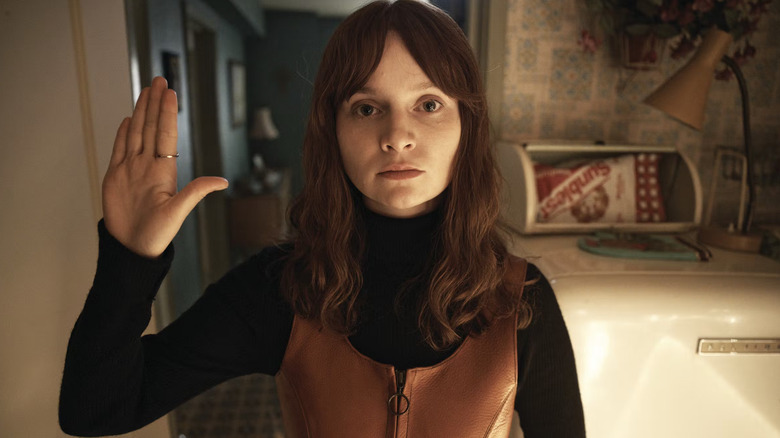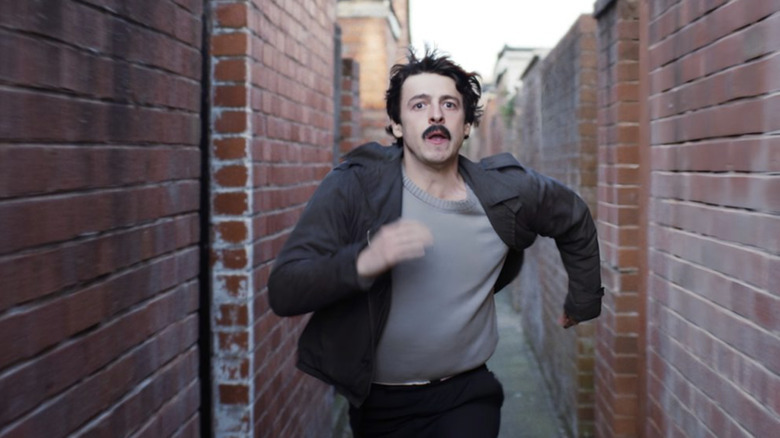The Emmys Overlooked The Real Best Limited Series Of 2024
We may receive a commission on purchases made from links.
The big Limited Series winners of the 77th Emmy Awards nominations are "The Penguin" (which retold "The Sopranos" in Gotham City), and the chilling drama "Adolescence." But there's one show that got shut out, FX's "Say Nothing," that's all about taking action for your beliefs. I'd be remiss if I didn't stand up and demand justice for the series, which was the best new television show I watched in 2024.
Created by Joshua Zetumer, "Say Nothing" adapts Patrick Radden Keefe's bestselling nonfiction book "Say Nothing: A True Story of Memory and Murder in Northern Ireland." That true story stretches from the 1970s to the 2010s, following Northern Irish youths who joined the Provisional Irish Republican Army (IRA) to fight for a united Ireland. Some of those youths, like Dolours Price (Lola Petticrew/Maxine Peake) and her sister Marian (Hazel Doupe/Helen Behan), got to grow up, but the cost was regret — both for what they did and that they did it for an ultimately fruitless war, as Ireland remains divided to this day.
"Say Nothing" was not totally shut out, granted. Zetumer and the show's final episode, "The People In The Dirt," netted a nomination for Outstanding Writing for a Limited or Anthology Series or Movie. The actors, though? Completely unrewarded, and the series itself was not nominated for Outstanding Limited or Anthology Series. I choose to believe that not enough Emmy voters bothered to watch "Say Nothing." I don't see any other way the much more lurid true crime show "Monsters: The Lyle and Erik Menendez Story" could've otherwise beaten it for a nomination.
Keefe's original book is filled with crackerjack prose backed up by substantial research, and "Say Nothing" the show is as good as the book. Now, admittedly, I came to the series from a place of closeness. I'm not just a fan of the book, I'm also Irish American and have long been compelled by stories of the IRA and "the Troubles" (as the 1960s-'90s conflicts in Northern Ireland are called). "Say Nothing" is beginning to end about native Irish people, but watching it as an Irish American, the show kicks away the romanticism of the revolution.
If you're a total novice about Irish history, though? You still owe it to yourself to hear what this series has to say, because it is hardly nothing.
Say Nothing is a riveting ride that asks hard questions
Now, "Say Nothing" is hardly a crowd pleaser; it's a show all about terrorism and the lingering scars it leaves. It's also not a dull history lesson, because it finds compelling hooks into the story of the IRA. On one hand, you have the Price sisters. Born into an Irish Republican family, the siblings initially try to peacefully protest for Catholic rights in the North. When they're beaten down, they opt for (as episode 1 is titled) "The Cause."
The second episode, "Land of Password, Wink, and Nod" (directed by Michael Lennox and written by Zetumer), is the chapter that goes down the easiest. It follows the Prices' early days as soldiers, when their duties include robbing a bank dressed as nuns or raiding a British army hospital. Their guerrilla war can seem like a grand adventure ... then the episode ends with IRA leader Brendan Hughes (Anthony Boyle) realizing one of his men is an informant. From there, the series highlights how few of the IRA's soldiers upheld their vow to say nothing. The members of the IRA spend as much time in "Say Nothing" killing their own as they do the British occupiers.
That leads to the second hook of "Say Nothing" and the driving mystery of both the original book and the show: Jean McConville (Judith Roddy), a single mother of 10 who was abducted and murdered by the IRA in 1972 for allegedly being a British informant. Her body was only discovered decades later, in which time her children were left with no confirmation of what happened to her.
"Say Nothing" is a multi-layered title. It's not just the promise of silence IRA volunteers took for the cause, but it's also about how the surviving ones chose to live when the war ceased. These soldiers weren't returning home from some far off land, the war they'd waged had been in their own community. They knew what they'd done, as did their neighbors, but the only way to keep a pretense of peace was to say nothing.
Speaking to Deadline in 2024, Peake discussed how she herself spoke to former IRA volunteers to prepare to play Dolours. (Though not the real Dolours, who died in 2013.) The questions Peake asked, and the show itself does through its characters, included:
"How does the rest of your life measure up in many ways when you've been through such extreme emotions, when you've been that close to death, when you've taken life? I don't know then — how [do] you process that and move forward?"
Bringing Say Nothing from the page to the screen
Later in their lives, Dolours and Hughes both chose to conduct interviews with Boston College's Belfast Project; the show recreates these interviews as its framing device. Others stayed tight-lipped. Northern Irish politician Gerry Adams (Josh Finan/Michael Colgan) has long been accused of being an IRA leader; "Say Nothing" certainly depicts him as one. But to this day, he still officially denies that charge. Even the series' solution to Jean McConville's murder is Keefe's educated guess because anyone who knows the truth hasn't spilled it.
"Say Nothing," as the title of Keefe's book claims, is a story about memory — but memories and recorded history are incomplete, so we often have to settle for stories. Keefe assembled these scattered memories of Northern Ireland's Troubles into a story. Even a much poorer writer than him could've captured the suspense and drama of this tale, but his stirring writing was the perfect blueprint for "Say Nothing" to be dramatized.
Of course, when it came to that dramatization, it was out of Keefe's hands and in just as capable ones belonging to the show's cast and crew. The younger stars like Petticrew, Doupe, and Boyle (carrying his scenes with chest-pumping charisma) are especially impressive. All three are Irish (Petticrew and Boyle hail from the North), so they bring extra authenticity to their roles.
Petticrew and Doupe are the glue that hold "Say Nothing" together, their performances complementing each other like the Price sisters do. The elder sister Dolours is initially the pluckier leader, but as the story goes on, she succumbs to disillusionment. Marian, on the other hand, never abandons her radicalization. Despite the sisters' differences, their mutual devotion is unshakeable, especially in the sixth episode, "Do No Harm," when they're imprisoned and hunger striking together. In a just world, both would be up for acting Emmys.
"Say Nothing" also honors time and place through its soundtrack, something Keefe obviously didn't have to worry about. In "Land of Password, Wink, and Nod," "Big Time" by '70s Belfast band Rudi plays as the Price sisters run away from their bank robbery. Episode director Lennox stages the robbery itself with unease, emphasizing the girls' clumsiness as criminals. It's only as they run home free that excitement, and the appropriate music, hits. Conversely, in episode 5, "Evil Little Maniacs," the ominous (and anachronistic) folk song "Devil's Spoke" by Laura Marling plays as the Prices prepare to bomb London.
Though "Say Nothing" the TV series stands on the shoulders of real history and its source material, it did a magnificent job adapting both — enough so that it deserved more recognition by the Emmys.
"Say Nothing" is streaming on Hulu in the United States and Disney+ elsewhere.


